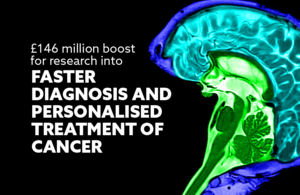T: 01822 851370 E: [email protected]
New Tech Deals Pave the Way for Advances in Cancer Treatment

 The Government has announced a series of major investments in cancer research and medical technology, aiming to bolster the country’s life sciences sector and enhance early cancer detection and treatment. The newly unveiled partnerships are expected to advance the development of cutting-edge diagnostic tools and therapies, positioning the UK as a global leader in medical innovation.
The Government has announced a series of major investments in cancer research and medical technology, aiming to bolster the country’s life sciences sector and enhance early cancer detection and treatment. The newly unveiled partnerships are expected to advance the development of cutting-edge diagnostic tools and therapies, positioning the UK as a global leader in medical innovation.
New Cancer Therapies and Tech Trials
The latest announcement includes a variety of UK-developed therapies for cancer, which will be tested through a series of new clinical trials. These trials will integrate emerging technologies, including artificial intelligence (AI) tools, to assist NHS professionals in spotting cancers earlier and providing more effective, personalized treatments. This initiative is backed by a combination of public and private sector investments, emphasizing a collaborative effort to deploy innovative diagnostic and treatment approaches.
Establishment of New Health Technology Hubs
One of the key highlights is the creation of five new research hubs across the UK, funded through a £118 million package from UK Research and Innovation. These hubs are designed to support the development of novel health technologies. The new centres will foster collaboration between academic institutions, healthcare providers, and private industry, focusing on various aspects of cancer research and other health challenges.
These hubs will engage in a range of projects, including:
- Imaging Tools for Surgery: Developed by University College London, these tools aim to help surgeons accurately identify and remove cancerous tumors.
- Wearable Technologies: Led by the University of Bristol, these will explore the use of wearable devices to monitor age-related health issues.
- Stem Cell Manufacturing: At the University of Glasgow, this hub will research therapies using adult stem cells, which could help regenerate damaged bone marrow.
Investment in AI and Data for Early Diagnosis
The initiative also includes a £6.4 million investment in a new AI digital pathology data platform, led by NHS England. This platform aims to integrate digital pathology data across the NHS, providing researchers with a secure network to train AI models that can enhance early diagnosis and precision in identifying cancer and other conditions.
Expanding the UK’s Life Sciences Industry
The life sciences industry is already a major contributor to the UK economy, generating £108 billion annually and supporting 300,000 jobs. The Government’s announcement is part of a broader strategy to attract further investment into the sector and stimulate economic growth. The government aims to capitalise on the country’s strong research capabilities and existing industrial base to launch a new wave of high-impact medical products.
Implications for NHS and Health Services
The adoption of these new technologies is seen as a key component in addressing some of the challenges highlighted in the recent Darzi Review, which pointed out that cancer survival rates in England are lower than in many comparable countries. The new initiatives aim to improve patient outcomes by bringing the latest technologies into routine NHS use, ultimately building an NHS that is better equipped to tackle future health challenges.
Looking Forward: Future Opportunities
With the upcoming International Investment Summit, the government is expected to further highlight the life sciences sector as a cornerstone of its strategy for economic growth and health innovation. The summit will provide an opportunity to showcase the UK’s strengths in research, development, and commercialisation, reinforcing its position as a prime destination for life sciences investment.
For more details and a further funding breakdown, read HERE.
 |
Kerry Booth, Chief Executive, Rural Services Network "These investments are fantastic news for enhancing access to health services through cutting-edge technology, which has the potential to transform care delivery in rural communities. However, to ensure these advancements are accessible to everyone, we must address the persistent digital connectivity gaps that many rural areas face. Without robust internet infrastructure and digital skills support, rural residents’ risk being left behind in accessing these life-saving innovations. It's essential that we prioritise bridging these connectivity gaps so that everyone, no matter where they live, can benefit from these advancements and have equitable access to improved health outcomes". |



